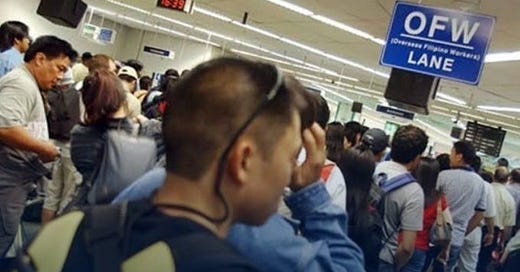We call OFWs the Bagong Bayani—heroes who prop up our economy, heal foreign patients, raise foreign children, build other nations’ skylines…
And whose sacrifices keep millions of Filipino families afloat.
But what those in power still refuse to fully grasp is this: OFWs are not just economic lifelines—they are a political force.
And if they decide to flex their power—not just in dollars, but in defiance—it could shake the very foundations of our governance and economy.
$38 BILLION WORTH OF INFLUENCE
In 2024 alone, OFWs sent home $38.34 billion—the highest in Philippine history. That’s more than what most of our export sectors bring in. These monthly flows, averaging $3 billion, account for over 8% of our GDP and prop up millions of households, especially in rural and provincial areas.
OFW remittances keep our peso stable, our balance of payments afloat, and our household consumption strong—which, in turn, fuels around 70% of national economic activity.
In short, if the government has anything left to boast about in this struggling economy, it’s largely because OFWs have kept sending money home, even through inflation, currency devaluation, and political turmoil.
WHAT HAPPENS IF THEY STOP?
Imagine if just 10% of OFWs delayed remitting for a month. That’s $300 million gone from circulation.
• The peso would weaken rapidly.
• Imports—including oil, food, and medicine—would become more expensive.
• Inflation would spike.
• Poor and middle-class families would suffer first.
• Government would scramble to plug budget holes as VAT revenues shrink.
• Investor confidence? Gone.
And suddenly, the government that ignored their voice would feel their silence—in its budget, in the market, and in its knees.
OFWs ARE WATCHING—AND WAKING UP!
They’re not the silent, grateful, smiling workers the state imagines.
When the Duterte-ICC issue erupted, when repatriations lagged during crises, when agencies imposed burdensome PhilHealth fees or failed to protect workers from abuse, the OFW community didn’t just grumble—they organized.
That’s why in 2025, whispers turned to waves. Calls for “Zero Remittance Week” surfaced—not out of hatred for the country, but as a form of peaceful resistance. A message. A reminder.
It wasn’t hatred for country.
It was love with boundaries.
A form of economic resistance.
A message: “We’re not blind. We’re not yours to use.”
A POLITICAL FORCE THE GOVERNMENT CAN’T IGNORE
The government may fear protesters at Mendiola or fiery speeches in Congress. But the silent click of a bank transfer not made? That’s power.
And the government will feel it harder than any rally ever could.
The OFW community is now:
• More connected than ever,
• More politically aware than ever,
• More ready to act than ever.
And they don’t need to carry placards to protest. They carry the economy. And if they decide—collectively, peacefully—that the government no longer deserves their support, it’s not just politics that will suffer. It’s survival.
Those in power must remind themselves that treating OFWs with token praise while betraying their values back home will only build pressure. And when that pressure turns into protest—financial or political—it will not be easy to contain.
LISTEN NOW, OR PAY THE PRICE LATER
To every policymaker reading this: wake up.
Don’t wait for remittances to stop before you start valuing the voices behind them.
Don’t weaponize silence as consent.
Don’t mistake sacrifice for subservience.
Because the Bagong Bayani of today are not just workers. They are voters. They are investors. They are family providers.
And they are becoming a united political bloc—a sleeping giant, no longer content to just send money and stay quiet.
They are watching. And if pushed further, they will speak—not with placards, but with power.
👊 POWER PUNCH
They don’t need to shout. Their silence could become strategy.
The next protest won’t be in the streets. It’ll be in the remittance centers—quiet, collective, and crushing.
The question is not whether OFWs still love the Philippines. The question is whether the Philippines still deserves their love.
•••
Disclaimer: This opinion piece is grounded in publicly available data and civic observation. It does not encourage any unlawful act or disruption of financial flows. It seeks to highlight the role of OFWs as an essential moral, economic, and political force, and advocates for respectful, accountable governance that honors their contributions.




Tama jud ka sir
…the last line just crushed my heart.